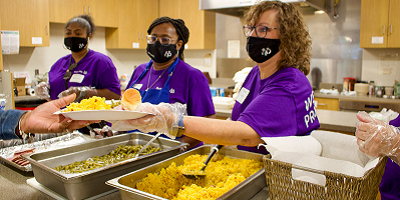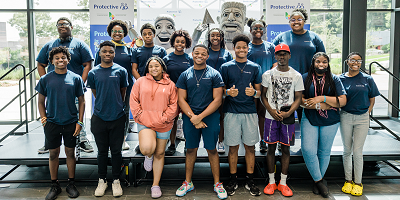Protective is honored to serve our more than 12 million customers, helping create financial security for so many people. But passion and empathy don’t stop at the office. Protective’s commitment to doing the right thing and serving others extends into our communities.
Through the Protective Life Foundation, we are dedicated to continuing to find ways to help our communities thrive and are grateful for the opportunity to support causes that serve our communities in profound ways.
We are proud to introduce you to some of the organizations the Foundation supports and share how they are impacting lives in their communities and beyond.
Society of St. Vincent de Paul
The Society of St. Vincent de Paul helps people in need with every aspect of life — social services, housing assistance, healthy eating and personal items. In Cincinnati, those services include a charitable pharmacy that provided 66,223 medications for free to people in need — one of only about 150 such pharmacies in the country.
“It’s a huge need,” says Rusty Curington, assistant director of the pharmacy. “Everyone seems to know about free clinics, but the prescriptions aren’t any good if you can’t afford the drugs.”
Curington says he has provided services from filling prescriptions during a Medicaid lapse to replacing asthma medication after a fire.
Other Society of St. Vincent de Paul programs and services include 11 neighborhood-based food pantries, a homelessness prevention program, seven thrift stores with clothing, furniture and household items for struggling families, the Bob and Sylvia Rahe Mattress Fund that provides beds to those in need, the Ozanam Center for Service Learning, drives to collect and distribute basic necessities, and a re-entry program that supports returning citizens with education, basic needs and more.
Innovation Depot
Tommy Mayfield was just looking for a better way to find a babysitter, but ended up founding a tech company. With the help of Innovation Depot, a Birmingham, Alabama-based tech startup program, he turned his dilemma into a product: Wyndy, an app that helps parents find and book pre-screened, trusted babysitters. Mayfield started working on the project in November of 2016, launched four months later and has since expanded to 17 markets across the Southeast.
Innovation Depot was invaluable in getting Wyndy off the ground, Mayfield says. “Having the opportunity to really focus on what you’re building, and having support in the form of capital, mentors and other community resources is what makes it unique.”
Companies working with Innovation Depot have access to world-class amenities and connect with mentors, investors, resource providers and other entrepreneurs. Innovation Depot also offers co-working space and educational courses such as Innovate Birmingham, a workforce initiative coding bootcamp and IT training program, and Covalence, a program for aspiring developers.
Linly Heflin Unit
A high school mission trip showed Kayleigh Hudson her passion for helping people. She didn’t know how she’d do it, though — living in a small town in rural Alabama, she saw her dream of attending Samford University as a financial long shot. The Linly Heflin Scholarship became her chance.
“It opened doors for me,” she says. “Linly Heflin helps people be able to make an impact in the world.” She now works on the innovation team of Compassion International. “I never could have fathomed my job now back in high school,” she says. “I didn’t even know it was my dream job.”
Founded 1919, the Linly Heflin Unit began as a women’s service organization that today focuses on furthering the education of young women in Alabama. The organization has awarded over 3,000 four-year scholarships to women attending Alabama colleges and universities.
Railroad Park Foundation
Green spaces connect people across cities. As an architect, Jessica Bennett knows all about the importance of green space. As president of the Railroad Park Foundation Junior Board, she knows the significance of Birmingham’s own famous green space that draws more than 500,000 visitors annually to exercise, celebrate, enjoy cooking classes or attend concerts and events. The 19-acre site boasts more than 600 trees, a beautiful lake, a bio-filtration wetlands area, and is even home to wildlife that had once disappeared from the downtown area.
“People need a place to get fresh air and recreation,” Bennett says. “It’s a nice break in a sea of concrete and brick buildings. On a pretty day at Railroad Park, you’ll find so many people from so many different parts of the city, even outside the city — drawn to this beautiful space.”
opened in September 2010. It is owned by the City of Birmingham and managed by the Railroad Park Foundation, a not-for-profit 501c3.
Jones Valley Teaching Farm
“Dirt was never in my plans” when she was young, says Shundria Mack, an instructor at Jones Valley Teaching Farm. But an internship with the farm during her junior year of high school changed those plans. Now a junior in college, she teaches children lessons that merge academic subjects with farming and food.
“Birmingham is a food desert, which makes it a perfect place for a teaching farm,” she says. “We plan lessons based on what the kids are learning in school. And even the small kids can take leadership of the farming spaces. Sometimes, they may not realize they’re cultivating leadership while they’re growing food.”
Jones Valley Teaching Farm was established in 2007 on a three-acre city block in downtown Birmingham. Today, the farm serves as a community garden with 38 raised beds as well as a teaching farm and learning laboratory. JVTF also delivers food-based education programs for pre-K-12 students at teaching farms on school campuses where young people can learn, create, explore and grow a healthy future for themselves and their communities through food.
16th Street Baptist Church
“16th Street Baptist Church is a place of education and of spiritual formation,” says Pastor Arthur Price.
16th Street Baptist Church is many things — a place of worship, a center for social activity in the black community going back more than a century. It is a historical landmark, as the site of a bombing in 1963 that killed four young girls and galvanized the Civil Rights Movement.
“We don’t want to just be known for the tragic events,” Price says. “But 16th Street Baptist Church isn’t just a church — it’s an iconic symbol of freedom, justice and equality.”
Organized in 1873, Sixteenth Street was the first Black church in Birmingham. The church has been at its current location since 1880 and in its current building since 1911. Today, the church offers history tours and a number of outreach programs focused on community health, mentoring and parenting, in addition to support for those suffering from homelessness, abuse and addiction.
Alabama 4-H Foundation
Mention 4-H, and people are more likely to imagine livestock shows than NASA data collection. But those are two — and only two — of the numerous projects the youth development program offers.
State 4-H ambassador Trey Reese says it’s about “endless opportunities” to explore subjects from animal husbandry to STEM, along with opportunities to meet new people and “see how diverse the world can be.”
“I credit 4-H for the advancement of my speaking and leadership skills,” says Reese, a Shades Valley High School senior now in his ninth year of 4-H’s leadership and citizenship programs. “I’m thinking about a career in business, in marketing or public relations, and this will help me get there.”
4-H is the youth development program of the U.S. Department of Agriculture and is also implemented by the Cooperative Extension system through more than 110 land-grant colleges and universities. Alabama 4-H seeks to empower youth ages 9-18 with skills to lead in their communities and beyond. Offered in all 67 Alabama counties, 4-H is the largest youth development program in Alabama with more than 125,700 youth reached each year.
Sidewalk Film Center and Cinema
For more than 20 years, Sidewalk Film Festival has been Birmingham’s annual celebration of movies, drawing filmgoers and independent and local films to Birmingham.
“Back before there was anything happening downtown, this was one weekend people all came downtown,” says perennial festival volunteer Laura Chappell.
A local film community has grown around the event, and Birmingham has even become an unexpected location for national film productions.
Sidewalk recently found a permanent home with the Sidewalk Film Center and Cinema, creating a year-round revenue source, contributing to the revitalization of Birmingham and supplementing its big event with films, programs and panels throughout the year.
“Now, there’s another reason to come downtown,” says Kevin Chappell, Laura’s husband and fellow volunteer.
Sidewalk is a federally recognized 501(c)(3) nonprofit organization dedicated to encouraging filmmaking in Alabama and building audiences for independent film. Since 1999, the organization has produced the nationally recognized Sidewalk Film Festival, showcasing more than 250 filmmakers and drawing 15,000 film lovers to Birmingham. In 2010, the festival expanded to include the SHOUT LGBTQ Film Festival.
Alabama Governor’s School
Hannah Hynds didn’t know that her high school administrators had nominated her for the Alabama Governor’s School. But in 2015, she became one of 90 gifted high school students from across the state selected for the program on Samford University’s campus.
For two weeks, the aspiring chemist became a working scientist.
“The classes were a lot more interactive, a lot more hands-on than I expected. Instead of just sitting and hearing someone lecture, we got to go out and experience things,” she says.
Now a senior chemistry major at Samford University, she’s already published a paper and presented a poster on research she’s performed.
“It helped me reaffirm that this is the field I wanted to go into,” she says, looking back at her experience.
The Alabama Governor’s School is a 13-day residential program that provides academic, creative and leadership experiences for gifted rising high school seniors in Alabama. Students participate in challenging seminars and team building activities led by academic, business and community experts.
Children’s of Alabama
Child life specialist Chloe Light works with some of the sickest children at Children’s of Alabama, a nationally ranked pediatric medical center that sees nearly 700,000 visits every year. Her job? Helping children with cancer understand their diagnoses and the often painful procedures they’ll have to undergo.
Having dealt with medical issues herself as a child, she knows the importance of developing coping skills and trying to find a sense of normalcy during long hospital stays. She says it seems odd to teach a child about cancer, IVs and chemo ports.
“But when I see their anxiety decrease, when I see them start understanding things and gaining confidence, that’s the most rewarding part,” she says. “We try to make the hospital seem a little less scary, a little more normal, a little more like home. It’s so important and so needed for patients and families who are going through this difficult time.”
Children’s of Alabama is a private, not-for-profit medical center that has provided specialized medical care of ill and injured children since 1911. It is ranked among the best pediatric medical centers in the nation by U.S. News & World Report and is one of the largest pediatric medical facilities in the United States.
United Ability
When an ultrasound at 25 weeks revealed that nearly half of Boston Smith’s brain had failed to develop, doctors weren’t sure she’d reach full term, much less survive delivery. But she did survive, and “came out her happy, diva self,” says her mother, Payton. With Boston’s trauma, however, came additional challenges, including visual, cognitive and motor impairments.
Payton turned to United Ability for early intervention to address those challenges. Now three years old, Boston receives physical and occupational therapy from United Ability. Its Hand In Hand Early Learning Program provides daycare with teachers trained and equipped to work with her special needs. Boston’s family receives exceptional therapy and coordinated services for their daughter, including financial support and equipment. With United Ability’s help, this special little girl will be able to live her potential.
Formerly United Cerebral Palsy of Greater Birmingham, United Ability’s mission is to provide innovative services connecting people with disabilities to their communities and empowering individuals to live full and meaningful lives.
Learn more about the partnership between Protective and United Ability.
Alabama CASA Network
Two decades ago, Shae Reed read “A Child Called It” by Dave Pelzer and knew she wanted to become a champion for children. In 2016, she was able to make it happen, volunteering with Alabama CASA Network as a Court Appointed Special Advocate (CASA). She works with children in state custody to support them and champion their best interests — which could mean the child returns to their family or moves to a safer, more nurturing home.
“Through CASA, I can focus on one child,” Reed says. “Sometimes, I can just let them know that the abuse isn’t their fault and give them the love they’re usually craving.”
And when their world is turning upside down, she can be their place of stability, comfort, and hope.
For over 35 years, the mission of the Alabama CASA Network, Inc. has been to equip and empower CASA programs and volunteers to advocate for Alabama’s abused and neglected children. Currently there are 14 CASA programs throughout Alabama and 20 Alabama counties with CASA programs.
Cornerstone Schools of Alabama
“At Cornerstone, we look at serving the complete student, and we view ourselves as partners with the community,” says Dedrick Agee, middle and high school principal at Cornerstone Schools. “We try to meet all the students’ needs — not only their academic needs, but their social needs as well.”
Cornerstone is a private Christian school dedicated to both academic achievement and character development.
“Right now, there are other factors that are going to contribute to their ability to learn,” Agee says. “A lot of issues we’re seeing in society aren’t just eight-to-three issues, they’re three-to-nine issues.”
In addition to standard lesson time, Cornerstone also works with parents on subjects ranging from healthy eating to social media usage.
“We see ourselves as an extension of each and every household in the communities we serve,” Agee says.
American Red Cross
Within two hours after the tornado cut a 29-mile-long swath across Alabama, American Red Cross Disaster Relief Operations Job Director Teddy Hampton had organized a four-week operation with volunteers who helped neighbors who lost homes and loved ones in the tragedy.
Hampton, an eighteen-year veteran of the American Red Cross, received the organization’s Presidential Award for Excellence for his service to the communities around Lee County, Alabama in the wake of a devastating tornado in 2019.
Hampton, of course, gives all the credit to his Disaster Services team, which is on constant alert to help families struck by hardships ranging from house fires to deadly storms.
“We can get help to people very quickly,” Hampton says. “You take total strangers, and you bring them together as an organization, and we can give life-changing assistance.”
For more than 130 years, the American Red Cross has delivered vital services to those in need, from disaster relief and international aid to collecting lifesaving blood and providing health and safety training to individuals and companies.
Learn more about the Protective Life Foundation
For more than 25 years, the Protective Life Foundation has been dedicated to improving the quality of life for our local communities and to collaborating with others to create the greatest possible impact. Visit protective.com to learn more about the Protective Life Foundation.
WEB.2082348.08.20





 To exercise your privacy choices,
To exercise your privacy choices,